Related Research Articles
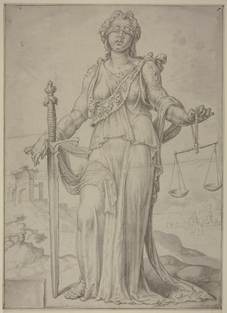
Justice, in its broadest sense, is the principle that people receive that which they deserve, with the interpretation of what then constitutes "deserving" being impacted upon by numerous fields, with many differing viewpoints and perspectives, including the concepts of moral correctness based on ethics, rationality, law, religion, equity and fairness.
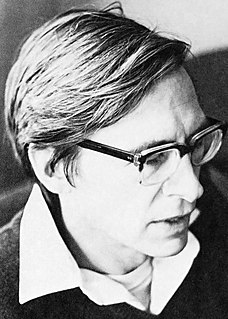
John Bordley Rawls was an American moral and political philosopher in the liberal tradition. Rawls received both the Schock Prize for Logic and Philosophy and the National Humanities Medal in 1999, the latter presented by President Bill Clinton, in recognition of how Rawls's work "helped a whole generation of learned Americans revive their faith in democracy itself".

Analytic philosophy is a branch and tradition of philosophy using analysis which is popular in the Western World and particularly the Anglosphere, which began around the turn of the 20th century in the contemporary era and continues today. In the United Kingdom, United States, Canada, Australia, New Zealand and Scandinavia, the majority of university philosophy departments today identify themselves as "analytic" departments.
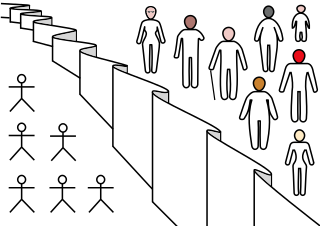
The original position (OP), often referred to as the veil of ignorance, is a thought experiment developed by American philosopher John Rawls to discover the principles that should structure a society of free, equal and moral people. Rawls claims that his Principles of Justice would be chosen by parties in the original position.
Reflective equilibrium is a state of balance or coherence among a set of beliefs arrived at by a process of deliberative mutual adjustment among general principles and particular judgments. Although he did not use the term, philosopher Nelson Goodman introduced the method of reflective equilibrium as an approach to justifying the principles of inductive logic. The term 'reflective equilibrium' was coined by John Rawls and popularized in his A Theory of Justice as a method for arriving at the content of the principles of justice.

A Theory of Justice is a 1971 work of political philosophy and ethics by the philosopher John Rawls, in which the author attempts to provide a moral theory alternative to utilitarianism and that addresses the problem of distributive justice. The theory uses an updated form of Kantian philosophy and a variant form of conventional social contract theory. Rawls's theory of justice is fully a political theory of justice as opposed to other forms of justice discussed in other disciplines and contexts.
In philosophy, economics, and political science, the common good refers to either what is shared and beneficial for all or most members of a given community, or alternatively, what is achieved by citizenship, collective action, and active participation in the realm of politics and public service. The concept of the common good differs significantly among philosophical doctrines. Early conceptions of the common good were set out by Ancient Greek philosophers, including Aristotle and Plato. One understanding of the common good rooted in Aristotle's philosophy remains in common usage today, referring to what one contemporary scholar calls the "good proper to, and attainable only by, the community, yet individually shared by its members."
Normative generally means relating to an evaluative standard. Normativity is the phenomenon in human societies of designating some actions or outcomes as good or desirable or permissible and others as bad or undesirable or impermissible. A norm in this normative sense means a standard for evaluating or making judgments about behavior or outcomes. Normative is sometimes also used, somewhat confusingly, to mean relating to a descriptive standard: doing what is normally done or what most others are expected to do in practice. In this sense a norm is not evaluative, a basis for judging behavior or outcomes; it is simply a fact or observation about behavior or outcomes, without judgment. Many researchers in this field try to restrict the use of the term normative to the evaluative sense and refer to the description of behavior and outcomes as positive, descriptive, predictive, or empirical.
Normative economics is a part of economics whose objective is fairness or what the outcome of the economy or goals of public policy ought to be.

Robert Paul Wolff is an American political philosopher and professor emeritus at the University of Massachusetts Amherst.
Philosophy and economics, also philosophy of economics, studies topics such as rational choice, the appraisal of economic outcomes, institutions and processes, the status of highly idealized economic models, the ontology of economic phenomena and the possibilities of acquiring knowledge of them.
David Schmidtz is a Canadian-American philosopher serving as Kendrick Professor of Philosophy and Eller Chair of Service-Dominant Logic at the University of Arizona, and editor-in-chief of the journal Social Philosophy and Policy. He was also the inaugural head of the Department of Political Economy and Moral Science at the University of Arizona.
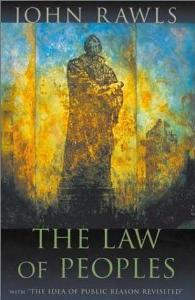
The Law of Peoples is American philosopher John Rawls' work on international relations. First published in 1993 as a short article, in 1999 it was expanded and joined with another essay, "The Idea of Public Reason Revisited" to form a full-length book. Rawls's basic distinction in international politics is that his preferred emphasis on a society of peoples is separate from the more conventional discussion of international politics as based upon relationships between states. It is an attempt to show "how the content of a Law of Peoples might be developed out of a liberal idea of justice similar to, but more general than, the idea I call justice as fairness".

Global justice is an issue in political philosophy arising from the concern about unfairness. It is sometimes understood as a form of internationalism.
"Instrumental" and "value rationality" are terms scholars use to identify two ways humans reason when coordinating group behaviour to maintain social life. Instrumental rationality recognizes means that "work" efficiently to achieve ends. Value rationality recognizes ends that are "right," legitimate in themselves.
Justice in economics is a subcategory of welfare economics. It is a "set of moral and ethical principles for building economic institutions." Economic justice aims to create opportunities for every person to have a dignified, productive and creative life that extends beyond simple economics.
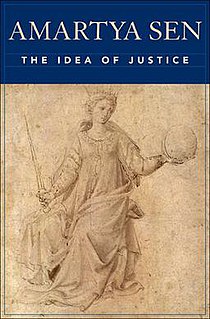
The Idea of Justice is a 2009 book by the economist Amartya Sen. The work is a critique and revision of the philosopher John Rawls's A Theory of Justice (1971).

The Racial Contract is an essay by the Jamaican philosopher Charles W. Mills in which he attempts to show that, although it is conventional to represent the social contract moral and political theories of Thomas Hobbes, John Locke, Jean-Jacques Rousseau, and Immanuel Kant as neutral with respect to race and ethnicity, in actuality, the philosophers understood them to regulate only relations between whites; in relation to non-whites, these philosophers helped to create a "racial contract", which in both formal and informal ways permitted whites to oppress and exploit non-whites and violate their own moral ideals in dealing with non-whites. Because in contemporary political philosophy, white philosophers take their own white privilege for granted, they don't recognize that white supremacy is a political system, and so in their developments of ideal, moral and political theory never consider actual practice. Mills proposes to develop a non-ideal theory "to explain and expose the inequities of the actual nonideal policy and to help us see through the theories and moral justifications offered in defense of them." Using it as a central concept, "the notion of a Racial Contract might be more revealing of the real character of the world we are living in, and the corresponding historical deficiencies of its normative theories and practices, than the raceless notions currently dominant in political theory."

Analytical Marxism is an approach to Marxist theory that was prominent amongst English-speaking philosophers and social scientists during the 1980s. It was mainly associated with the September Group of academics, so called because of their biennial September meetings to discuss common interests. Described by G. A. Cohen as "non-bullshit Marxism", the group was characterized, in the words of David Miller, by "clear and rigorous thinking about questions that are usually blanketed by ideological fog." Members of this school seek to apply the techniques of analytic philosophy, along with tools of modern social science such as rational choice theory, to the elucidation of the theories of Karl Marx and his successors.

Philosophy of ecology is a concept under the philosophy of science, which is a subfield of philosophy. Its main concerns centre on the practice and application of ecology, its moral issues, and the intersectionality between the position of humans and other entities. This topic also overlaps with metaphysics, ontology, and epistemology, for example, as it attempts to answer metaphysical, epistemic and moral issues surrounding environmental ethics and public policy.
References
- 1 2 3 Robeyns, Ingrid (2008). "Ideal Theory in Theory and Practice". Social Theory and Practice. 34 (3): 341–362. doi:10.5840/soctheorpract200834321. ISSN 0037-802X.
- 1 2 Stemplowska, Zofia (2017-05-15), "What's Ideal About Ideal Theory?", Theories of Justice, Routledge, pp. 205–232, doi:10.4324/9781315236322-32, ISBN 978-1-315-23632-2
- 1 2 3 Loureiro, Marco (2015). "Ideal Theory and Its Applicability: Are Principles Independent from Facts?". Revista Diacrítica. 29 (2): 231–250. ISSN 0870-8967.
- 1 2 Schmidtz, David (2011). "Nonideal Theory: What It Is and What It Needs to Be". Ethics. 121 (4): 772–796. doi:10.1086/660816. ISSN 0014-1704. JSTOR 10.1086/660816. S2CID 144510752.
- ↑ Stemplowska, Zofia; Swift, Adam (2012-06-18). Estlund, David (ed.). "Ideal and Nonideal Theory". The Oxford Handbook of Political Philosophy. doi:10.1093/oxfordhb/9780195376692.001.0001. ISBN 9780195376692 . Retrieved 2020-05-15.
- 1 2 Rawls, John, 1921-2002, author. (December 2005). A theory of justice. ISBN 978-81-7534-175-3. OCLC 908122343.CS1 maint: multiple names: authors list (link)
- 1 2 3 Valentini, Laura (2012-08-22). "Ideal vs. Non-ideal Theory: A Conceptual Map". Philosophy Compass. 7 (9): 654–664. doi:10.1111/j.1747-9991.2012.00500.x. ISSN 1747-9991.
- ↑ Farrelly, Colin (December 2007). "Justice in Ideal Theory: A Refutation". Political Studies. 55 (4): 844–864. doi:10.1111/j.1467-9248.2007.00656.x. ISSN 0032-3217. S2CID 145781022.
- ↑ Mills, Charles W. (2017-05-15), ""Ideal Theory" As Ideology", Theories of Justice, Routledge, pp. 565–584, doi:10.4324/9781315236322-31, ISBN 978-1-315-23632-2